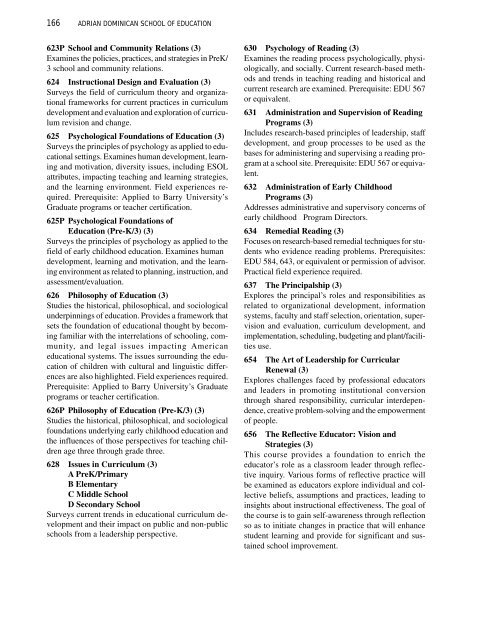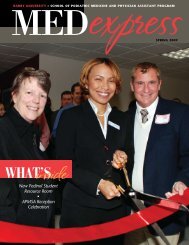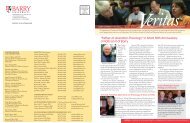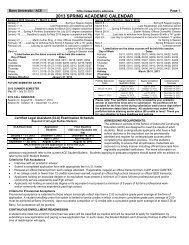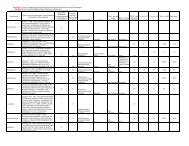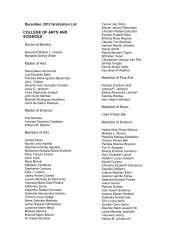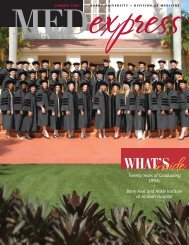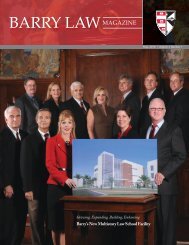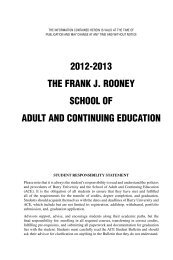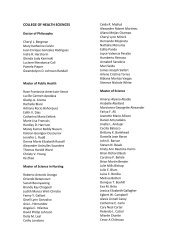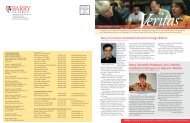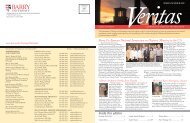2004-2005 - Barry University
2004-2005 - Barry University
2004-2005 - Barry University
You also want an ePaper? Increase the reach of your titles
YUMPU automatically turns print PDFs into web optimized ePapers that Google loves.
166 ADRIAN DOMINICAN SCHOOL OF EDUCATION<br />
623P School and Community Relations (3)<br />
Examines the policies, practices, and strategies in PreK/<br />
3 school and community relations.<br />
624 Instructional Design and Evaluation (3)<br />
Surveys the field of curriculum theory and organizational<br />
frameworks for current practices in curriculum<br />
development and evaluation and exploration of curriculum<br />
revision and change.<br />
625 Psychological Foundations of Education (3)<br />
Surveys the principles of psychology as applied to educational<br />
settings. Examines human development, learning<br />
and motivation, diversity issues, including ESOL<br />
attributes, impacting teaching and learning strategies,<br />
and the learning environment. Field experiences required.<br />
Prerequisite: Applied to <strong>Barry</strong> <strong>University</strong>’s<br />
Graduate programs or teacher certification.<br />
625P Psychological Foundations of<br />
Education (Pre-K/3) (3)<br />
Surveys the principles of psychology as applied to the<br />
field of early childhood education. Examines human<br />
development, learning and motivation, and the learning<br />
environment as related to planning, instruction, and<br />
assessment/evaluation.<br />
626 Philosophy of Education (3)<br />
Studies the historical, philosophical, and sociological<br />
underpinnings of education. Provides a framework that<br />
sets the foundation of educational thought by becoming<br />
familiar with the interrelations of schooling, community,<br />
and legal issues impacting American<br />
educational systems. The issues surrounding the education<br />
of children with cultural and linguistic differences<br />
are also highlighted. Field experiences required.<br />
Prerequisite: Applied to <strong>Barry</strong> <strong>University</strong>’s Graduate<br />
programs or teacher certification.<br />
626P Philosophy of Education (Pre-K/3) (3)<br />
Studies the historical, philosophical, and sociological<br />
foundations underlying early childhood education and<br />
the influences of those perspectives for teaching children<br />
age three through grade three.<br />
628 Issues in Curriculum (3)<br />
A PreK/Primary<br />
B Elementary<br />
C Middle School<br />
D Secondary School<br />
Surveys current trends in educational curriculum development<br />
and their impact on public and non-public<br />
schools from a leadership perspective.<br />
630 Psychology of Reading (3)<br />
Examines the reading process psychologically, physiologically,<br />
and socially. Current research-based methods<br />
and trends in teaching reading and historical and<br />
current research are examined. Prerequisite: EDU 567<br />
or equivalent.<br />
631 Administration and Supervision of Reading<br />
Programs (3)<br />
Includes research-based principles of leadership, staff<br />
development, and group processes to be used as the<br />
bases for administering and supervising a reading program<br />
at a school site. Prerequisite: EDU 567 or equivalent.<br />
632 Administration of Early Childhood<br />
Programs (3)<br />
Addresses administrative and supervisory concerns of<br />
early childhood Program Directors.<br />
634 Remedial Reading (3)<br />
Focuses on research-based remedial techniques for students<br />
who evidence reading problems. Prerequisites:<br />
EDU 584, 643, or equivalent or permission of advisor.<br />
Practical field experience required.<br />
637 The Principalship (3)<br />
Explores the principal’s roles and responsibilities as<br />
related to organizational development, information<br />
systems, faculty and staff selection, orientation, supervision<br />
and evaluation, curriculum development, and<br />
implementation, scheduling, budgeting and plant/facilities<br />
use.<br />
654 The Art of Leadership for Curricular<br />
Renewal (3)<br />
Explores challenges faced by professional educators<br />
and leaders in promoting institutional conversion<br />
through shared responsibility, curricular interdependence,<br />
creative problem-solving and the empowerment<br />
of people.<br />
656 The Reflective Educator: Vision and<br />
Strategies (3)<br />
This course provides a foundation to enrich the<br />
educator’s role as a classroom leader through reflective<br />
inquiry. Various forms of reflective practice will<br />
be examined as educators explore individual and collective<br />
beliefs, assumptions and practices, leading to<br />
insights about instructional effectiveness. The goal of<br />
the course is to gain self-awareness through reflection<br />
so as to initiate changes in practice that will enhance<br />
student learning and provide for significant and sustained<br />
school improvement.


